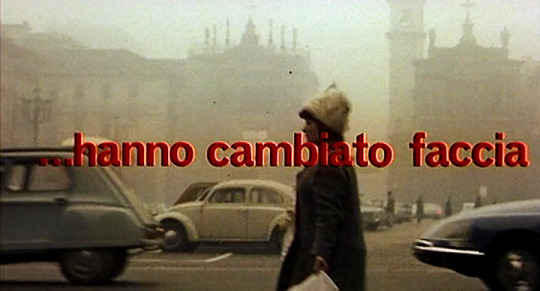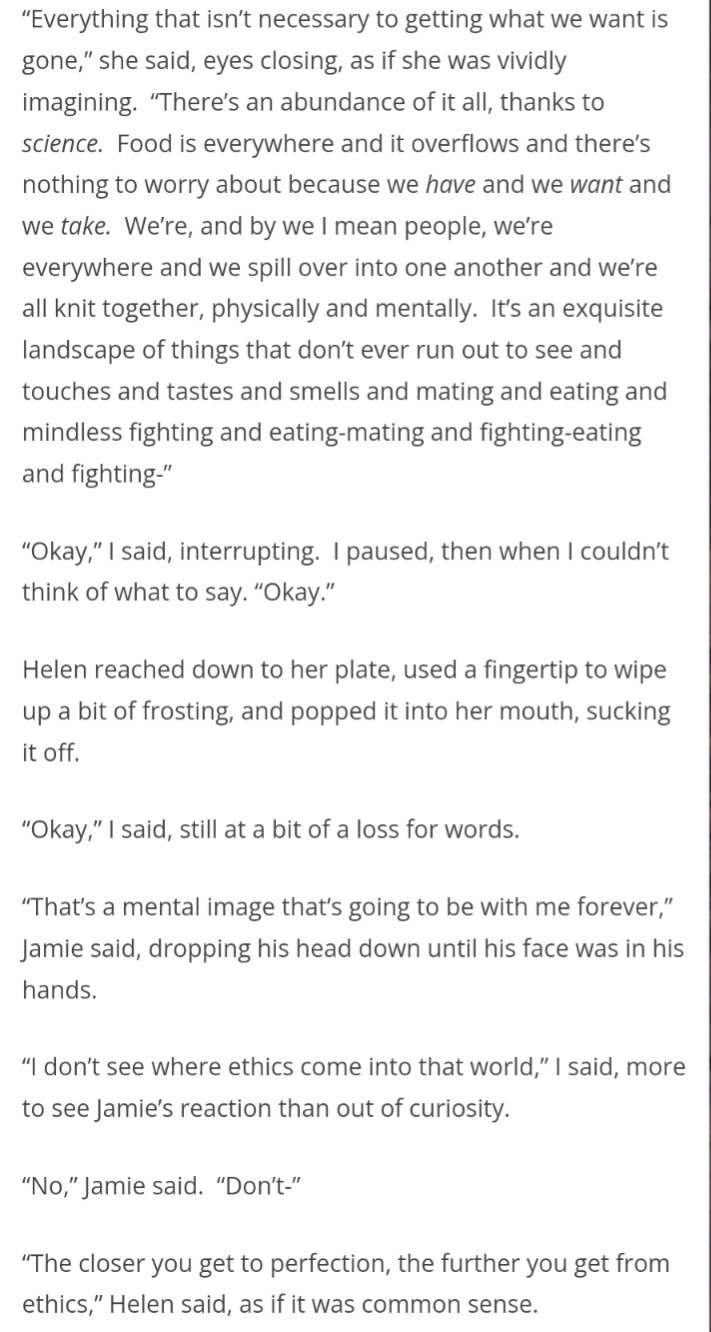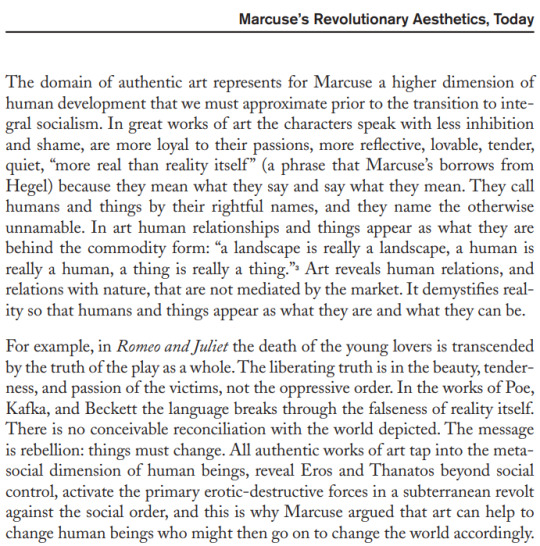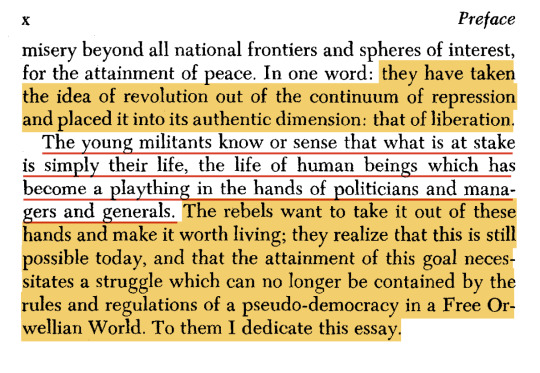#herbert marcuse
Quote
Art breaks open a dimension inaccessible to other experience, a dimension in which human beings, nature, and things no longer stand under the law of the established reality principle... The encounter with the truth of art happens in the estranging language and images which make perceptible, visible, and audible that which is no longer, or not yet, perceived, said, and heard in everyday life.
Herbert Marcuse, The Aesthetic Dimension
#philosophy#quotes#Herbert Marcuse#The Aesthetic Dimension#art#images#language#experience#reality#truth#aesthetics
239 notes
·
View notes
Text
Western civilization has always glorified the hero, the sacrifice of life for the city, the state, the nation; it has rarely asked the question of whether the established city, state, nation were worth the sacrifice. The taboo on the unquestionable prerogative of the whole has always been maintained and enforced, and it has been maintained and enforced the more brutally the more the whole was supposed to consist of free individuals. The question is now being asked - asked from without - and it is taken up by those who refuse to play the game of the affluents - the question of whether the abolition of this whole is not the precondition for the emergence of a truly human city, state, nation.
Herbert Marcuse, Eros and Civilization
55 notes
·
View notes
Photo










Corrado Farina, ...Hanno cambiato faccia, 1971
#gothic horror#eurohorror#...hanno cambiato faccia#they have changed their face#cinema italiano#corrado farina#geraldine hooper#giuliano disperati#adolfo celi#1970s#70s#herbert marcuse#one-dimensional man#consumerism#orrore#italian horror
90 notes
·
View notes
Text

Helen said fully automated luxury gay space communism. We stan a marcusian vat-grown queen
25 notes
·
View notes
Text
Perhaps only the most extreme imagery can elucidate the depth dimension of history, the web of pleasure and terror, truth and deception in eternal recurrence. But the imagery is not enough; it must become saturated with its reality: symbolism must recapture that which it symbolizes. The king must be shown not only as father but as king, that is to say, as master and lord; war and competition and communication must be shown not only as copulation but as war and business and speech. Unless the analysis takes the road of return from the symbolic to the literal, from the illusion to the reality of the illusion, it remains ideological, replacing one mystification by another.
Brown’s concept of illusion (sleep, dream) covers, undifferentiated, the latent and the overt content of history, or, it de-realizes reality. To him, the political kingdoms are ‘shadows’, political power is a fraud: the emperor has no new clothes, he has no clothes at all. But unfortunately, he does: they are visible and tangible; they make history. In terms of the latent content, the kingdoms of the earth may be shadows: but unfortunately, they move real men and things, they kill, they persist and prevail in the sunlight as well as in the dark of night. The king may be an erected penis, and his relation to the community may be intercourse; but unfortunately, it is also something very different and less pleasant and more real. Brown skips the mediations which transform the latent into the overt content, sex into politics, the subrational into the rational. Thus he is stuck with the time-honored quandary of psychoanalysis: the airplane is a penis symbol, but it also gets you in a couple of hours from Berlin to Vienna.
"Love mystified: A critique of Norman O. Brown," Herbert Marcuse, Negations, 1968.
24 notes
·
View notes
Text

"Eros y civilización", de Herbert Marcuse
#eros y civilización#herbert marcuse#marcuse#libros#libro#book#books#books books books#books on books#bookgram#bookgasm#booklover#bookriot#bookworms#booktubers#bookstagramarg#book look#book now#book advice#buenos aires#men reading#boys and books#books and boys#books & boys#boys#leo y comparto#leo y reseño#livros#classic books#igerbooks
9 notes
·
View notes
Text
“La società industriale contemporanea tende a essere totalitaria. Il termine ‘totalitario’, infatti, non si applica soltanto a un’organizzazione politica terroristica della società, ma anche a un’organizzazione economicotecnica non terroristica che opera mediante la manipolazione dei bisogni da parte di interessi costituiti”
Herbert Marcuse, "L’uomo a una dimensione"
86 notes
·
View notes
Text

The Dialectics of Liberation edited by David Cooper with contributions by R. D. Laing, Stokely Carmichael, Herbert Marcuse, amongst others.
#books#vintage books#penguin books#pelican books#david cooper#r d laing#stokely carmichael#herbert marcuse#1968#60s
8 notes
·
View notes
Text

#philosophy#quotes#Herbert Marcuse#The Aesthetic Dimension#Marcuse#truth#art#artists#creativity#reality
15 notes
·
View notes
Text
Today I learned:
So, Frankfurt School. Marcuse. Today's class was on the subjugation of the object by the concept.
I know what this sounds like:
Oh, some psuedo-logical abstract manipulation of words that leads to intractable language games.
But nah. Let me expound on this gold nugget of an idea. What does it mean to conceptualize an object? To categorize, abstract, generalize. It means that you subsume the object under the concept. The object's identity becomes a mere instance of the concept. What does this look like?
That's just a chair.
You just subsumed the object under the concept. The object is now reduced to the particular, chosen concept that was selected for the subjugation of the particularity of that object. But what does this mean? You might say. So what? It seems innocuous. But nah. It's not. It's actually the beginning of a rigid reification of thought. If that object is now JUST a chair, then all the meaning you associate and create will now be chair-related. Chair replaces the particularity of the object.
But it's JUST A CHAIR.
NO! You think it's JUST a chair because of the reification of concepts. The conceptual strata you live in is static and inflexible because of this type of reduction. It is a subjugation of particularity. It is not just a chair. It is also formerly a tree. And from Australia. And was home to some birds. And was your grandfather's. It's also a door stopper, an object that weighs some specific kilograms, etc.
Now. So what. What can we do about it? This seems like a feature of meaning making rather than a flaw, you might say. That's intelligent, but get this. What if we could liberate the particularity of the object? That's the goal of Marcuse and others in the Frankfurt school.
Ok. Maybe you're still unconvinced. Maybe you don't care about chairs or weight... But what about people? What about racism and sexism and all forms of stereotyping? All of these are instances of the subjugation of the individual under a concept. "They're X because they're Chinese. He's X because he's autistic. She's X because she's a woman." We are SUBJUGATING PEOPLE UNDER CONCEPTS. REDUCING THEM TO CATEGORIES.
Let's stop, people. Embrace the particularity of the particular. Create new categories. Recognise the limitations of all categories. Never believe in claims about exhaustive categorisation. Particularity always escapes exhaustive categorisation. Let us liberate the object from the concept and appreciate the particularities of the particulars all around us.
#philosophy#frankfurt school#herbert marcuse#concepts#racism#sexism#gender theory#social ontology#continental#political theory#learning#writing#lecture#college
4 notes
·
View notes
Quote
Free election of masters does not abolish the masters or the slaves.
Herbert Marcuse, One-Dimensional Man
150 notes
·
View notes
Text
Under the rule of a repressive whole, liberty can be made into a powerful instrument of domination. The range of choice open to the individual is not the decisive factor in determining the degree of human freedom, but what can be chosen and what is chosen by the individual. The criterion for free choice can never be an absolute one, but neither is it entirely relative. Free election of masters does not abolish the masters or the slaves. Free choice among a wide variety of goods and services does not signify freedom if these goods and services sustain social controls over a life of toil and fear—that is, if they sustain alienation. And the spontaneous reproduction of superimposed needs by the individual does not establish autonomy; it only testifies to the efficacy of the controls.
Herbert Marcuse, One-Dimensional Man
3 notes
·
View notes
Text
I’ve been thinking recently that the modern term ‘intersectionality’ is essentially a new application of the basic theoretical approach of dialectical materialism. I’m not as familiar with Kimberlé Crenshaw (who coined the concept) as I’d like, but I think it’s neigh undeniable that her work, and indeed much of the Third Wave, to some significant degree built on the (black) socialist feminism of figures like Audre Lorde, bell hooks, and most importantly Angela Davis (whose doctoral advisor was none other than Herbert Marcuse).
If this is even remotely the case, it also means that the reason intersectionality is so important to confronting our stratified, racialised, gender troubled political economy is precisely because it’s an extension of the exact methodology which György Lukács characterised as the defining feature of Marxism, and it is therefore central to understanding class struggle and thereby developing class consciousness.
In other words, intersectionality is simply a more recent application of dialectical materialism which emphasises identities as the basis to observe that what’s true for one group or class may not be so for another, likely due to marginalisation or disenfranchisement.
#intersectionality#dialectical materialism#socialist feminism#Marxism#Kimberlé Crenshaw#Angela Davis#Audre Lorde#bell hooks#Herbert Marcuse#György Lukács#original#intersectional feminism#Marxist feminism
70 notes
·
View notes
Text

Marcuse's Revolutionary Aesthetics, Today
14 notes
·
View notes
Text

this preface fucks so incredibly hard
5 notes
·
View notes
Text
Reflections on Marcuse’s critique of Analytic Philosophy
The mysticism of enlightenment philosophy and the analytic style that followed it can be understood as follows: privileging universals as metaphysically more significant than the particulars they pick out. For Marcuse, the truth of abstraction, is that for any particulars ‘xyz’, any abstraction which picks them out as having property ‘u’ , inherently reduces them to that common feature. In doing so, abstraction misses the richness of particulars; it fails to live up to them. And yet One-dimensional society needs to manufacture the notion that particulars are the ones that fail to live up to the universal.
It is not merely a platonic union of Logos (reasoning) and Eros (desire), it is also their paradoxical union and separation. The universal is more real than the particular, and therefore it cannot be desired in the same way. The universal unifies Logos and Eros and simultaneously conceals Eros, replacing it with a cold mystical eroticism (Marcuse, p.150). We are compelled by a reason which, due to this separation from Eros cannot recognize itself as particular. Hence we must mythologize the universality of Reason as a condition for the possibility of universals in general. Here we find the explanation for both the intuitionism of analytic philosophers (G.E Moore) and the transcendental arguments of Kant. Consider Nietzsche’s criticism of Kant in Beyond Good and Evil. “By virtue of a Faculty” is ultimately the explanation given for the discovered categories. Reason tells me ‘it must be so’ says Kant. Nietzshe asks ‘Why must synthetic Judgements be necessary?’, really they should “not ‘be possible’ at all; we have no right to them; in our mouths they are nothing by false judgements”.
Reason compels us, but we never question how or why it does so. This benefits one dimensional society. If our reason is not our reason, and rather a piece of a greater unified reason, then we can only understand ourselves as part of a singular whole. Even when the metaphysical myths underpinning our worldview crumble, analytic philosophy can only retreat farther into the reified universe of universals. “By classifying and distinguishing meanings, and keeping them apart, [wittgenstein] purges thought and speech of contradictions, illusions, and transgressions. But the transgressions are not those of ‘pure reason’. They are not metaphysical transgressions beyond the limits of possible knowledge, they rather open a realm of knowledge beyond common sense and formal logic” (Marcuse p.186). Common sense and formal logic are the only kinds of knowledge analytic philosophers tend to recognize because they cannot accommodate pluralist epistemologies.
Nowadays, if you were to ask a more open minded academic why we should only philosophize within the bounds of ordinary language, logic, or conceptual analysis, they would likely quickly praise other ways of thinking. But in practice there is powerful resistance to alternative modes of thought. It is not just that we cannot easily imagine what they would look like, it is that our engagement with the established norms is so deeply ingrained that we do not even know how we would start living our lives differently. In academics, the unspoken agreement is that for knowledge to be valuable it must make itself smaller and smaller; that it is more respectable to be an unknown expert than a local intellectual. In philosophy, this kind of work relegates itself to the trivial conceptual analysis, and strips itself of all transgressive potential from the get go. The welfare state provides safety, but it also establishes a hegemony wherein the citizen exists only in direct rapport with society as a whole. This relationship allows the desires of citizens to be manufactured through repressive desublimation, but this fact is hidden from them. The most powerful of these manufactured desires is Rationality, it is so deeply ideological that we no longer recognize it as erotic at all, nor can we conceive of the original life instinct it replaced.
7 notes
·
View notes